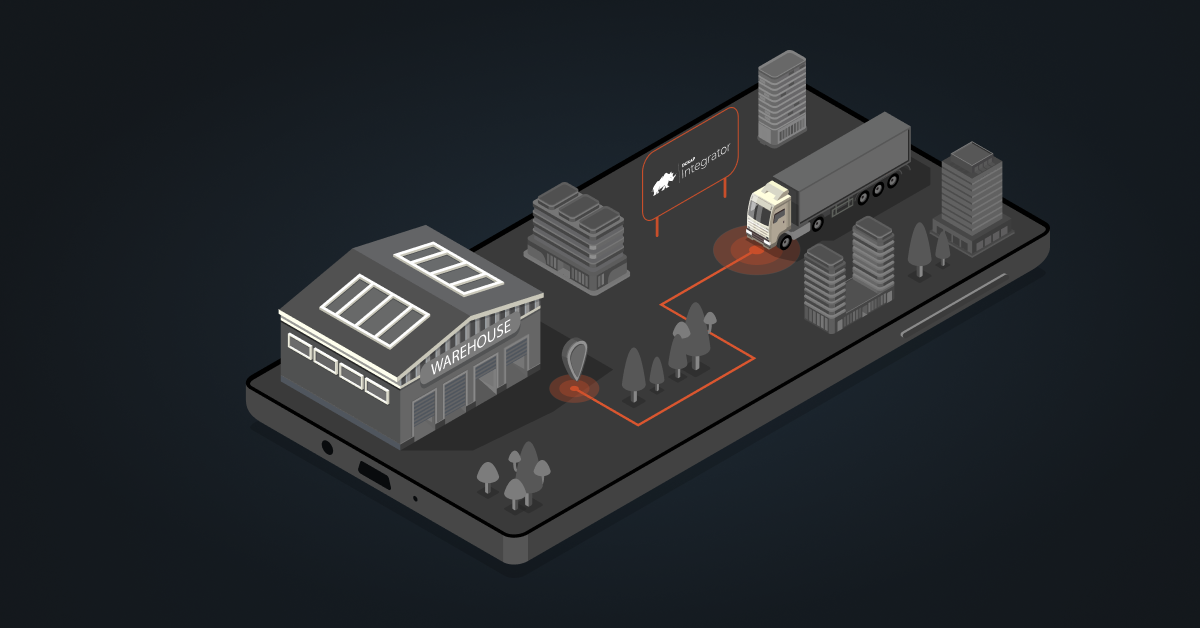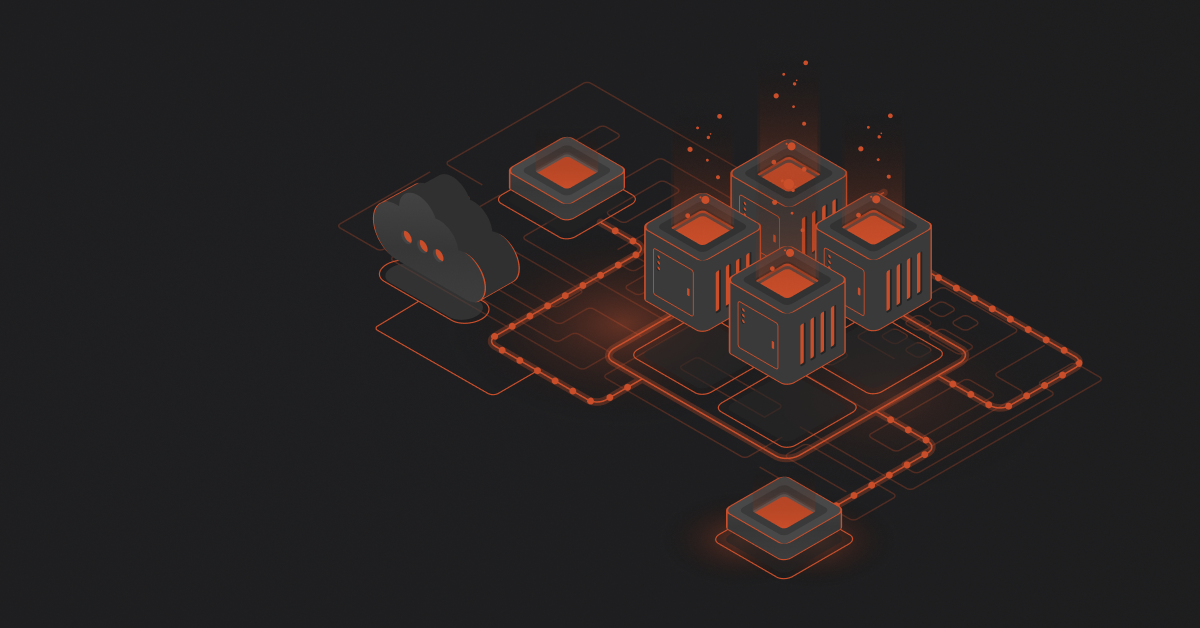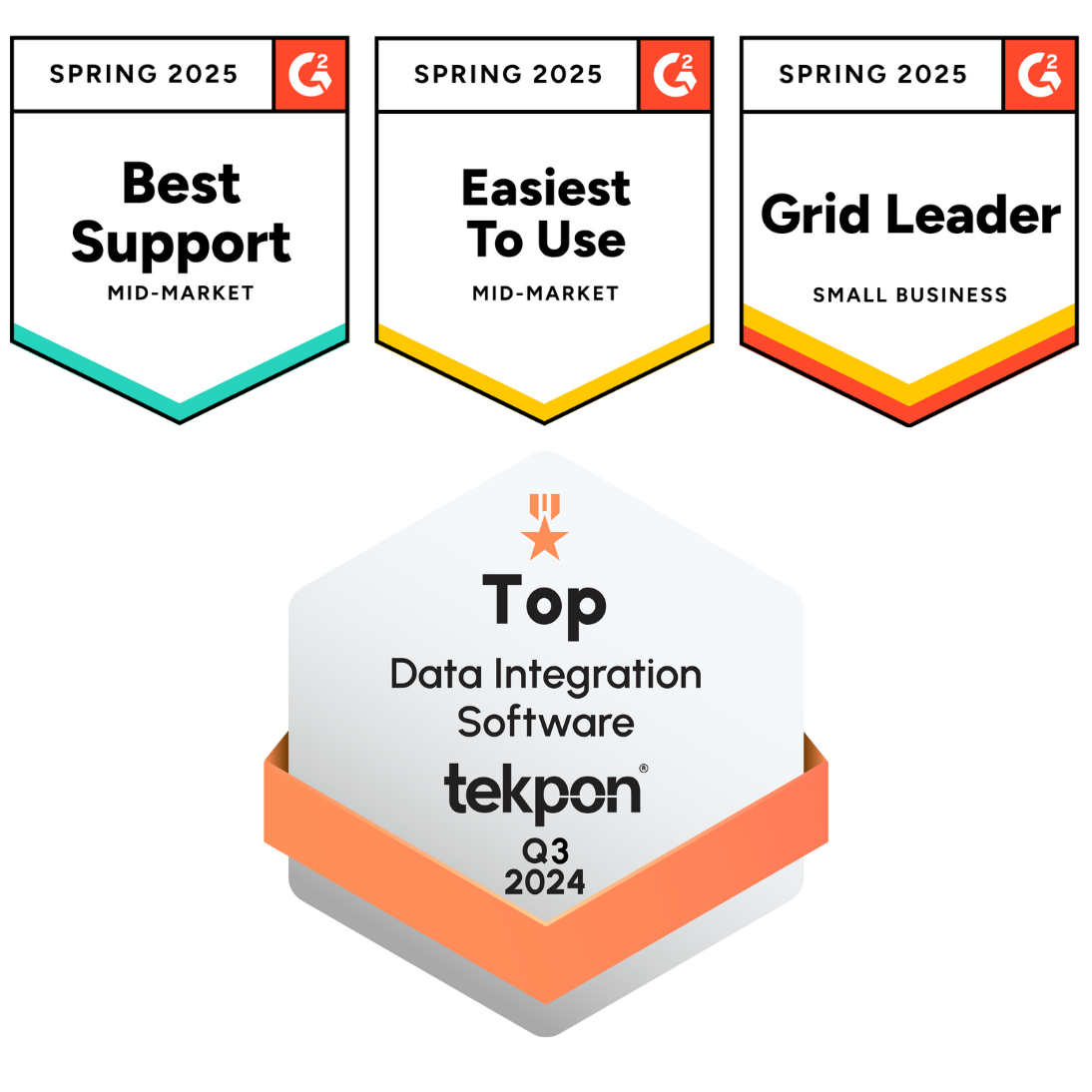If you’re a small or mid-sized distributor, chances are you’ve faced this scene too often:
- Orders from Shopify or BigCommerce come in.
- You scramble to update inventory in your ERP manually.
- Picking happens late because stock levels weren’t accurate.
- Shipping labels are generated manually from another system.
- Customers get wrong or late orders, and you lose trust.
Sound familiar? You’re not alone. Most SMB distributors start lean, but quickly hit chaos as order volume grows and systems don’t talk to each other. That’s exactly where DCKAP Integrator can step in.
The Connected Warehouse Loop
Warehouse system integration isn’t just about APIs. It’s about syncing the entire flow.

Without integration:
- Manual Entry: Manual data entry between disconnected systems creates error-prone workflows that lead to picking mistakes, shipping errors, and costly inventory discrepancies.
- Stockouts and Delayed Shipments: Without real-time integration, inventory isn’t accurately tracked across systems, causing overselling and poor order prioritization that results in stockouts and delayed customer shipments.
- Data Silos and Errors: Systems can’t communicate, leading to duplicate data entry, inconsistent information, and manual errors that cascade through operations.
- Equipment Bottlenecks: Automated systems operate independently without coordination, creating traffic jams and inefficient material flow between processes.
- Scalability Problems: Adding new automated equipment becomes complex and expensive when systems can’t easily connect or share data with existing infrastructure.
With integration:
- Orders flow from Magento/BigCommerce to ERP and WMS software: Integration automatically transfers order details from e-commerce platforms directly to warehouse and accounting systems, eliminating manual order entry and reducing processing delays.
- Inventory updates in real-time: Stock levels are instantly synchronized across all platforms when items are picked, received, or moved, preventing overselling and ensuring accurate availability displays to customers.
- Shipping labels and tracking are auto-generated: Once orders are fulfilled, shipping labels are automatically created and tracking numbers are generated, streamlining the dispatch process without manual intervention.
- ERP is updated for invoicing: Order completion automatically triggers invoice generation in the ERP system, ensuring accurate billing and financial reporting without additional data entry steps.
This is where DCKAP Integrator comes in, ensuring real-time, error-free warehouse system integration.
Also see: Understanding Inventory Control and Warehouse Automation
Why Integration Is a Game-Changer for Distributors
Here’s what SMB distributors gain from automated ERP and WMS integration:
| Benefit | Real-World Impact |
| Real-time inventory sync | No more overselling or stockouts |
| Error-free order fulfillment | No manual re-entry across systems |
| Automated shipping | Generate labels, track packages, notify customers |
| Faster order-to-cash | Clean hand-off from order to invoice |
| Less headcount, more output | Automation replaces hiring more admin staff |
Why Most Off-the-Shelf Tools Fail
Plugins and simple API connectors break when your business scales or adds complexity. They can’t handle:
- Multi-directional sync
- Multi-system workflows
- Lot tracking or B2B pricing models
- Peak order volumes
Enter DCKAP Integrator: Built for Distributors, Trusted by Distributors
As a distributor, I don’t need another generic tool-I need something built for the way we actually work. That’s where DCKAP Integrator comes in.
This is not just another integration platform. DCKAP Integrator is purpose-built for distributors, and it connects the systems we actually use every day:
- ERP systems like Epicor Prophet 21 (P21), Eclipse, SAP B1, Acumatica, and NetSuite
- eCommerce platforms like Magento (M2), Shopify, BigCommerce, and EvolutionX
- WMS and shipping platforms like Fishbowl, Tecsys, Extensiv, and ShipStation
Whether you’re syncing orders from Shopify into P21, updating inventory in real time across BigCommerce and EvolutionX, or automating shipping with ChannelAdvisor or EasyPost, DCKAP Integrator handles it: no code, no chaos.
Use Cases for Automated Warehouse Workflows with DCKAP Integrator:
- Order Sync: Clean, automated flow from your web store or marketplace into your ERP.
- Inventory Updates: Ensure your stock levels are accurate across every channel – without manual entry.
- Shipping Automation: Auto-generate labels, push tracking, and fulfill faster with tools like ShipStation.
- Multi-Channel Orchestration: Run Amazon, EvolutionX, Shopify, and more, while keeping your ERP in control.
Step-by-Step Breakdown of the Integration Workflow
1. Customer Places Order (Shopify / BigCommerce / Magento)
- The process begins when a customer places an order on your eCommerce store or B2B portal.
- Order data includes SKU, quantity, price, shipping method, etc.
DCKAP Integrator captures this order data.
2. Order Syncs into ERP (e.g., Epicor, SAP, Acumatica, NetSuite)
- DCKAP Integrator automatically transfers the order to your ERP.
- This updates:
- Customer record
- Order status
- Inventory reservation
- AR (Accounts Receivable)
- Customer record
3. Inventory Check & Picking Triggered in WMS
- The ERP and WMS are synced to verify stock availability.
- A pick ticket is generated and pushed to the WMS (Warehouse Management System).
If no full WMS is used, an inventory system integrated with the ERP handles this step.
4. Pick, Pack, and Prepare for Shipping
- The WMS/Inventory system guides warehouse workers to:
- Pick items from shelves
- Pack them according to the order
- Pick items from shelves
Once packed, DCKAP Integrator marks the order ready for shipment.
5. Shipping Label Generation via TMS or ShipStation
- DCKAP Integrator connects to a shipping platform (like ShipStation, EasyPost, or FedEx/UPS API).
- It fetches shipping rates, generates labels, and assigns tracking numbers.
6. Shipment Confirmation Sent Back to ERP + Customer
- Once shipped, shipping data flows back:
- To ERP: for inventory deduction and financial closure
- To Customer: via email or tracking page
- To CRM or portal: for status updates
- To ERP: for inventory deduction and financial closure
7. Invoice Auto-Created in ERP (Order-to-Cash Completion)
- DCKAP Integrator triggers invoice generation in the ERP.
- The finance team can now follow up on payment terms.
8. Reports, Logs & Monitoring (Integrator Dashboard)
- Every step – from order sync to shipment – is logged.
- Exceptions, errors, and retries are visible in DCKAP Integrator’s dashboard.
What Systems Should SMB or Mid-level Distributors Integrate First?
If you’re a growing distributor, integrating your systems isn’t just a tech upgrade – it’s how you unlock accuracy, speed, and scale. But where do you start?
Here’s the priority:
1. ERP ↔ Order Channels
Orders are the lifeblood of your business. That’s why your first integration should connect your order channels (like Magento, BigCommerce, Shopify, Amazon, or EvolutionX) to your ERP (Epicor P21, NetSuite, SAP B1, etc.).
Why first?
- It eliminates manual entry.
- Enables real-time inventory sync and confirmations.
- Accelerates order-to-cash.
2. ERP ↔ Inventory / WMS
Next, connect your ERP with your inventory system or WMS (like Fishbowl, Extensiv, or Tecsys). This ensures:
- Inventory is updated with every order.
- Pick/pack operations start automatically.
- Your warehouse stays in sync with customer promises.
3. Inventory ↔ Shipping Platforms
Finally, automate your outbound flow. Integrate tools like ShipStation, ShippingEasy, or ChannelAdvisor with your inventory/WMS so that:
- Labels generate instantly.
- Tracking updates go out on time.
- Fulfillment is fast and accurate.
Whether you start with your order channels or warehouse, DCKAP Integrator gives you the flexibility to scale at your pace. Its drag-and-drop interface, pre-built connectors, and B2B distribution expertise make integration feel less like IT – and more like growth.
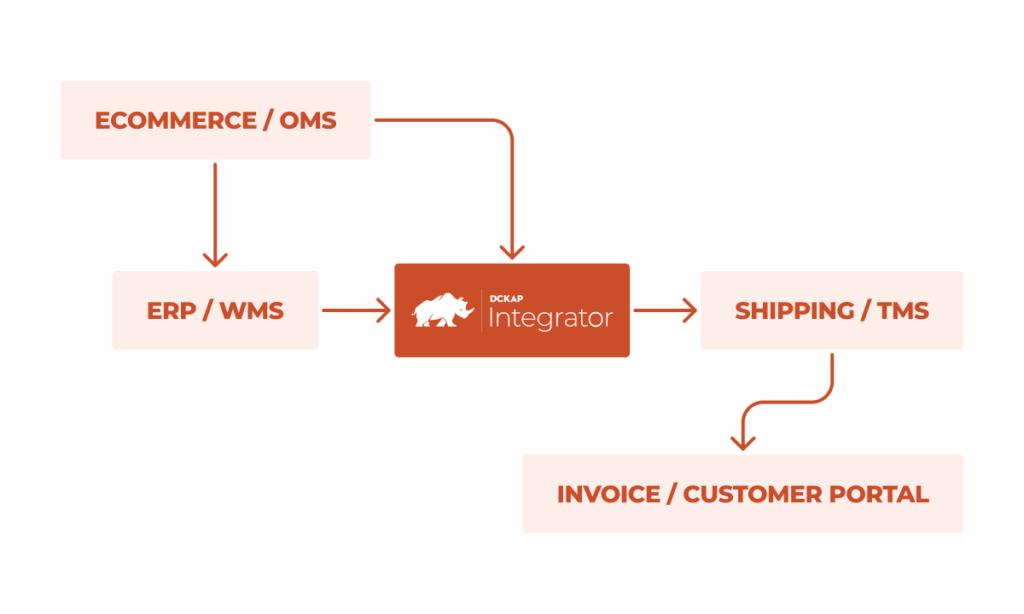
Simplified breakdown of WMS-to-Shipping sync via DCKAP Integrator
Recommended System Integration Priorities for SMB Distributors
| Scenario | Integrate First | Reason |
| High order volume, multi-channel | ERP ↔ Order Channels | Enables automated, error-free order intake platforms |
| Manual order entry causing errors | ERP ↔ Order Channels | Reduces human error and improves processing speed |
| Clean order intake, but slow warehouse | ERP ↔ WMS | Automates pick/pack and reduces warehouse bottlenecks |
| Scaling up or implementing WMS | ERP ↔ WMS | Ensures alignment of inventory and warehouse tasks with ERP |
| Starting from scratch | ERP ↔ Order Channels, then WMS | Orders drive the rest of the process; WMS comes next |
| High fulfillment volume or strict shipping SLAs | Inventory/WMS ↔ Shipping System | Automates label generation, tracking, and carrier selection |
| Frequent delays in label generation or tracking updates | Inventory/WMS ↔ Shipping System | Improves customer communication and reduces manual shipping work |
| Selling to large retailers or manufacturers with EDI requirements | ERP ↔ EDI | Automates required document exchanges (POs, ASNs, Invoices) and avoids chargebacks or lost business |
See How These Distributors Are Winning with DCKAP Integrator
DCKAP Integrator is ERP-first, cloud-native, and secure, with support for high transaction volumes. Customers love it for how well it works for their preferred systems, how its matches their requirements, and the continued support they get from DCKAP’s integration engineers.
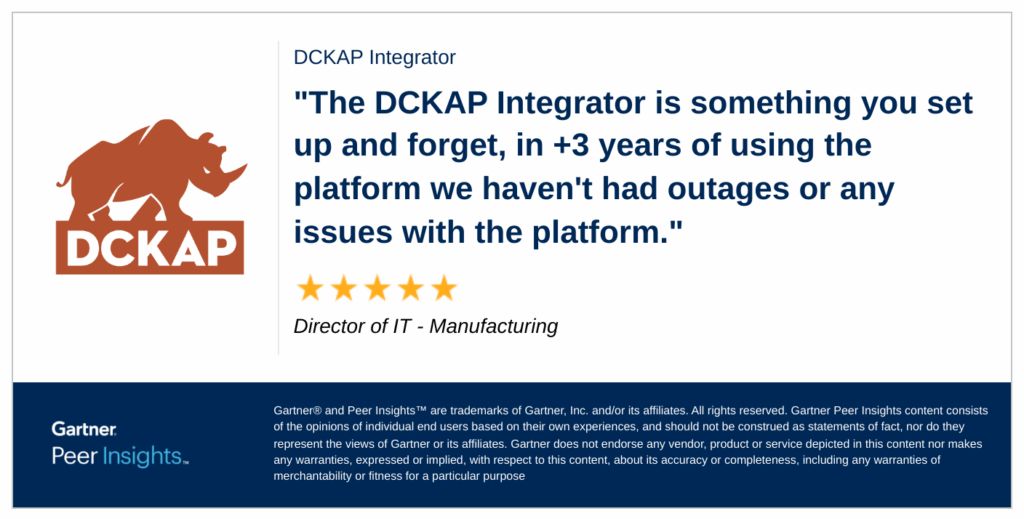
FAQs
1. What types of distributors use DCKAP Integrator?
DCKAP Integrator is purpose-built for small and mid-sized wholesale and industrial distributors. It supports businesses using ERPs like Epicor Prophet 21, SAP B1, Acumatica, and NetSuite, selling through platforms like Shopify, Magento, BigCommerce, Amazon, and EvolutionX, and managing logistics with WMS systems (like Fishbowl, Extensiv, Tecsys) and shipping platforms (like ShipStation, EasyPost, and FedEx/UPS).
It also supports EDI integration, enabling seamless electronic document exchange with large retailers or manufacturers.
2. Can I use DCKAP Integrator if I don’t have a full WMS yet?
Absolutely. Many growing distributors use the inventory modules inside their ERP instead of a full Warehouse Management System (WMS). DCKAP Integrator connects your ERP with your eCommerce and shipping systems now—and can easily support WMS integration when you’re ready to scale.
3. How does DCKAP Integrator help reduce manual errors?
By automating the flow of data between your ERP, eCommerce, inventory management tool, and shipping systems, DCKAP Integrator eliminates the need for manual processes including data entry. This reduces fulfillment mistakes, prevents inventory mismatches, ensures accurate invoicing, and improves overall efficiency, cost savings, and customer satisfaction.
4. Do I need a developer to manage integrations?
No. DCKAP Integrator is a no-code platform with a drag-and-drop interface, designed for non-developers. Your operations or IT team can manage integrations without writing code. And if needed, DCKAP’s implementation team offers expert support to help you scale confidently.
With streamlined order-to-cash workflows, real-time data visibility, and no-code customization, DCKAP Integrator helps you grow—without growing complexity.
5. What are the key benefits can automated warehouse operations offer?
- Real-time data sharing between all systems eliminates manual labor and errors
- Coordinated equipment prevents bottlenecks and optimizes material flow
- Complete inventory visibility through connected RFID, scanners, and IoT
- Automated order processing from receipt to shipping without manual handoffs
- Better analytics from combined data across all operations
- Easier scaling when adding new automated equipment
6. What can DCKAP Integrator do for my business?
A lot! From integration that lines up with your needs, to cutting down hours of manual work. Simply schedule a chat with our integration experts to discuss your specific requirements.

